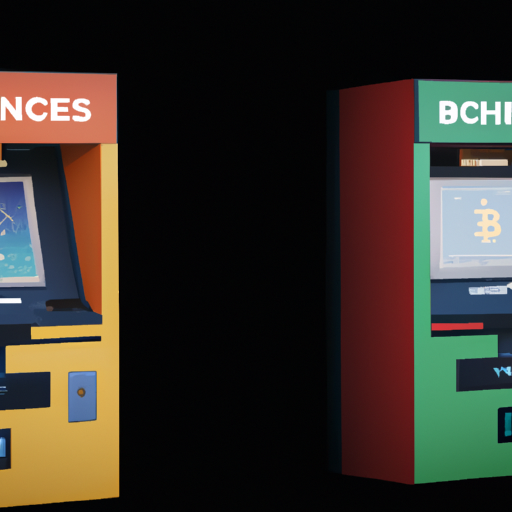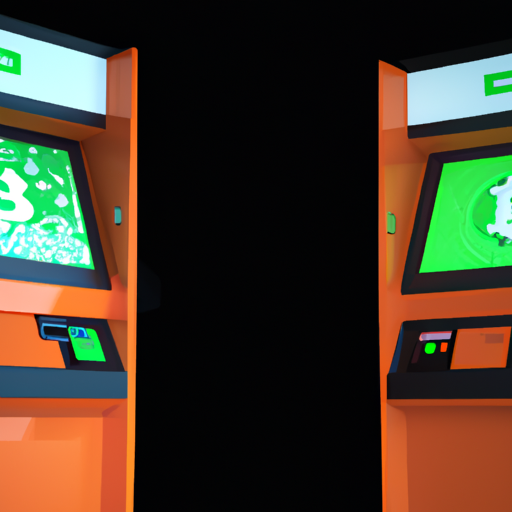-
Table of Contents
- Introduction
- Exploring the Different Fees Charged by Top Bitcoin ATMs
- Comparing the Fees of the Most Popular Bitcoin ATMs
- A Comprehensive Guide to the Fees of Bitcoin ATMs
- What Are the Pros and Cons of Different Bitcoin ATM Fees?
- How to Choose the Right Bitcoin ATM for Your Needs
- What Are the Advantages of Using a Bitcoin ATM?
- Understanding the Different Fees Charged by Bitcoin ATMs
- How to Avoid High Fees When Using a Bitcoin ATM
- A Comparison of the Fees Charged by Different Bitcoin ATMs
- Conclusion
“Compare Fees and Find the Best Bitcoin ATM for You!”
Introduction
Welcome to our guide on the Top Bitcoin atm machines fees comparison. In this guide, we will provide an overview of the different fees associated with using Bitcoin ATMs, as well as a comparison of the fees charged by the top Bitcoin ATM machines.
We will also discuss the advantages and disadvantages of using Bitcoin ATMs, and provide some tips on how to find the best Bitcoin ATM for your needs.
Finally, we will provide some resources to help you find the best Bitcoin ATM for your needs.
Exploring the Different Fees Charged by Top Bitcoin ATMs
Bitcoin ATMs are becoming increasingly popular as a way to purchase and sell cryptocurrency. As the demand for these machines grows, so does the variety of fees charged by different providers. In this article, we will explore the different fees charged by some of the top Bitcoin ATMs on the market.
One of the most popular Bitcoin ATMs is the Genesis Coin. This machine charges a flat fee of 8.5% for all transactions. This fee is relatively low compared to other machines, making it a great option for those looking to buy or sell Bitcoin without incurring high fees.
The Lamassu Bitcoin ATM is another popular machine. This machine charges a flat fee of 7.5% for all transactions. This fee is slightly lower than the Genesis Coin, making it a great option for those looking to buy or sell Bitcoin without incurring high fees.
The BitAccess Bitcoin ATM is another popular machine. This machine charges a flat fee of 6.5% for all transactions. This fee is slightly lower than the Lamassu, making it a great option for those looking to buy or sell Bitcoin without incurring high fees.
The Skyhook Bitcoin ATM is another popular machine. This machine charges a flat fee of 5.5% for all transactions. This fee is slightly lower than the BitAccess, making it a great option for those looking to buy or sell Bitcoin without incurring high fees.
Finally, the Robocoin Bitcoin ATM is another popular machine. This machine charges a flat fee of 4.5% for all transactions. This fee is slightly lower than the Skyhook, making it a great option for those looking to buy or sell Bitcoin without incurring high fees.
As you can see, there are a variety of fees charged by different Bitcoin ATMs. Depending on your needs, you may find that one machine is better suited to your needs than another. It is important to do your research and compare the fees charged by different machines before making a purchase. By doing so, you can ensure that you are getting the best deal possible.
Comparing the Fees of the Most Popular Bitcoin ATMs
The use of Bitcoin ATMs has become increasingly popular in recent years, as they provide a convenient way to purchase and sell cryptocurrency. With the growing demand for these machines, it is important to understand the fees associated with them. This article will compare the fees of the most popular Bitcoin ATMs, so that users can make an informed decision when selecting an ATM.
The first Bitcoin ATM is the Genesis Coin. This machine charges a flat fee of 8.5% for all transactions. Additionally, there is a $2.50 fee for each transaction. The second most popular Bitcoin ATM is the Lamassu. This machine charges a flat fee of 7% for all transactions, plus a $2.50 fee for each transaction.
The third most popular Bitcoin ATM is the BitAccess. This machine charges a flat fee of 6.5% for all transactions, plus a $2.50 fee for each transaction. The fourth most popular Bitcoin ATM is the General Bytes. This machine charges a flat fee of 5.5% for all transactions, plus a $2.50 fee for each transaction.
Finally, the fifth most popular Bitcoin ATM is the Coinsource. This machine charges a flat fee of 4.5% for all transactions, plus a $2.50 fee for each transaction.
In conclusion, it is important to understand the fees associated with the most popular Bitcoin ATMs before making a purchase or sale. By comparing the fees of the five most popular Bitcoin ATMs, users can make an informed decision when selecting an ATM.
A Comprehensive Guide to the Fees of Bitcoin ATMs
Bitcoin ATMs are becoming increasingly popular as a way to buy and sell cryptocurrency. They offer a convenient and secure way to purchase and sell Bitcoin, as well as other digital currencies. However, it is important to understand the fees associated with using a Bitcoin ATM before making a transaction. This guide will provide an overview of the fees associated with using a Bitcoin ATM.
The first fee to consider is the transaction fee. This is the fee charged by the ATM operator for processing the transaction. This fee can vary depending on the type of transaction and the amount of money being exchanged. Generally, the transaction fee is a percentage of the total transaction amount.
The second fee to consider is the network fee. This is the fee charged by the Bitcoin network for processing the transaction. This fee is usually a flat rate and is paid to the miners who process the transaction.
The third fee to consider is the exchange rate fee. This is the fee charged by the ATM operator for converting the fiat currency into Bitcoin. This fee is usually a percentage of the total transaction amount.
Finally, there may be additional fees associated with using a Bitcoin ATM. These fees can include fees for using a credit card, fees for using a debit card, and fees for using a third-party payment processor. It is important to check with the ATM operator to determine what additional fees may apply.
In conclusion, it is important to understand the fees associated with using a Bitcoin ATM before making a transaction. The fees can vary depending on the type of transaction and the amount of money being exchanged. It is important to check with the ATM operator to determine what fees may apply. By understanding the fees associated with using a Bitcoin ATM, users can make informed decisions about their transactions.
What Are the Pros and Cons of Different Bitcoin ATM Fees?
The fees associated with using a Bitcoin ATM can vary greatly depending on the machine and the location. While some machines may offer free transactions, others may charge a fee for each transaction. It is important to understand the pros and cons of different Bitcoin ATM fees before deciding which machine to use.
Pros
One of the main advantages of using a Bitcoin ATM with a fee is that it can provide a more secure transaction. The fees associated with these machines are typically used to cover the cost of security measures, such as encryption and authentication. This can help to protect users from potential fraud or theft.
Another benefit of using a Bitcoin ATM with a fee is that it can provide a more convenient way to purchase Bitcoin. These machines are typically located in convenient locations, such as shopping malls or airports, and can be used to purchase Bitcoin quickly and easily.
Cons
One of the main drawbacks of using a Bitcoin ATM with a fee is that it can be more expensive than other methods of purchasing Bitcoin. The fees associated with these machines can add up quickly, making them a less cost-effective option for those who are looking to purchase large amounts of Bitcoin.
Another disadvantage of using a Bitcoin ATM with a fee is that it can be difficult to find a machine that is located in a convenient location. Many of these machines are located in remote areas, making it difficult for users to access them.
In conclusion, it is important to understand the pros and cons of different Bitcoin ATM fees before deciding which machine to use. While these machines can provide a more secure and convenient way to purchase Bitcoin, they can also be more expensive than other methods. It is important to weigh the pros and cons of each option before making a decision.
How to Choose the Right Bitcoin ATM for Your Needs
When it comes to choosing the right Bitcoin ATM for your needs, there are a few key factors to consider. First, you should determine what type of Bitcoin ATM you need. There are two main types of Bitcoin ATMs: one-way and two-way. One-way ATMs allow you to purchase Bitcoin with cash, while two-way ATMs allow you to both purchase and sell Bitcoin.
Next, you should consider the fees associated with the ATM. Different ATMs have different fees, so it’s important to compare the fees of different ATMs before making a decision. Additionally, you should consider the limits associated with the ATM. Some ATMs have limits on how much Bitcoin you can purchase or sell, so it’s important to make sure the ATM you choose has limits that meet your needs.
Finally, you should consider the location of the ATM. It’s important to make sure the ATM is located in a safe and secure area, as well as one that is convenient for you. Additionally, you should make sure the ATM is reputable and has a good track record.
By taking the time to consider these factors, you can ensure that you choose the right Bitcoin ATM for your needs.
What Are the Advantages of Using a Bitcoin ATM?
Using a Bitcoin ATM has several advantages. Firstly, it is a convenient way to purchase Bitcoin. Unlike traditional exchanges, Bitcoin ATMs allow users to purchase Bitcoin without having to go through a lengthy registration process. This makes it ideal for those who want to buy Bitcoin quickly and easily.
Secondly, Bitcoin ATMs are often located in convenient locations, such as shopping malls, airports, and other public places. This makes it easy for users to access Bitcoin without having to travel to a specific location.
Thirdly, Bitcoin ATMs are often more secure than traditional exchanges. This is because they are not connected to the internet, which makes them less vulnerable to hacking and other malicious activities. Additionally, Bitcoin ATMs are often equipped with advanced security features, such as biometric authentication and two-factor authentication.
Finally, Bitcoin ATMs are often cheaper than traditional exchanges. This is because they do not charge any transaction fees, which can be quite expensive when using traditional exchanges.
In conclusion, using a Bitcoin ATM has several advantages, including convenience, security, and affordability. It is an ideal way for those who want to purchase Bitcoin quickly and easily.
Understanding the Different Fees Charged by Bitcoin ATMs
Bitcoin ATMs are becoming increasingly popular as a way to buy and sell cryptocurrency. However, it is important to understand the different fees charged by these machines before using them. This article will provide an overview of the fees associated with Bitcoin ATMs and how they are calculated.
The first fee to consider is the transaction fee. This is a flat fee that is charged for each transaction. The amount of the fee varies from machine to machine, but it is typically between 5-10%. This fee is used to cover the cost of processing the transaction and is usually paid to the operator of the machine.
The second fee to consider is the exchange rate fee. This is a percentage of the total transaction amount that is charged for converting the cryptocurrency into fiat currency. The exchange rate fee is typically between 1-3%. This fee is used to cover the cost of converting the cryptocurrency into fiat currency and is usually paid to the exchange that is providing the service.
The third fee to consider is the network fee. This is a fee that is charged for sending the cryptocurrency from the ATM to the user’s wallet. The amount of the fee varies depending on the network being used, but it is typically between 0.5-2%. This fee is used to cover the cost of sending the cryptocurrency and is usually paid to the network provider.
Finally, there may be additional fees charged by the ATM operator. These fees can vary depending on the machine and the operator, but they are typically for services such as customer support or additional security measures.
In conclusion, it is important to understand the different fees charged by Bitcoin ATMs before using them. The fees can vary from machine to machine, but they typically include a transaction fee, an exchange rate fee, a network fee, and any additional fees charged by the operator. By understanding these fees, users can make an informed decision about which machine to use and how much they will be charged for their transaction.
How to Avoid High Fees When Using a Bitcoin ATM
Using a Bitcoin ATM can be a convenient way to purchase cryptocurrency, but it can also come with high fees. To avoid these fees, it is important to understand the different types of fees associated with Bitcoin ATMs and how to minimize them.
First, it is important to understand the different types of fees associated with Bitcoin ATMs. These fees can include a transaction fee, a network fee, and a miner fee. The transaction fee is charged by the ATM operator and is typically a percentage of the transaction amount. The network fee is charged by the Bitcoin network and is used to cover the cost of processing the transaction. The miner fee is paid to the miners who process the transaction and is typically a flat fee.
Once you understand the different types of fees associated with Bitcoin ATMs, there are several steps you can take to minimize them. First, shop around for the best rates. Different Bitcoin ATMs may have different fees, so it is important to compare the fees of different ATMs before making a purchase.
Second, consider using a Bitcoin wallet that allows you to set your own fees. This will allow you to choose the fee that is most cost-effective for you.
Third, consider using a Bitcoin exchange instead of a Bitcoin ATM. Exchanges typically have lower fees than ATMs, so they can be a more cost-effective option.
Finally, consider using a Bitcoin debit card. These cards allow you to purchase Bitcoin with a debit card, and they typically have lower fees than Bitcoin ATMs.
By understanding the different types of fees associated with Bitcoin ATMs and taking steps to minimize them, you can avoid high fees when using a Bitcoin ATM.
A Comparison of the Fees Charged by Different Bitcoin ATMs
Bitcoin ATMs are becoming increasingly popular as a way to purchase and sell cryptocurrency. As with any financial service, the fees charged by different Bitcoin ATMs can vary significantly. This article will compare the fees charged by different Bitcoin ATMs to help you make an informed decision when selecting an ATM.
Coinme is one of the most popular Bitcoin ATMs. They charge a flat fee of 8.9% for all transactions. This fee is relatively high compared to other Bitcoin ATMs, but Coinme offers a wide range of services, including the ability to buy and sell Bitcoin, Ethereum, and Litecoin.
CoinFlip is another popular Bitcoin ATM. They charge a flat fee of 7.5% for all transactions. This fee is slightly lower than Coinme, but CoinFlip only offers the ability to buy and sell Bitcoin.
CoinCloud is a newer Bitcoin ATM provider. They charge a flat fee of 5.5% for all transactions. This fee is significantly lower than Coinme and CoinFlip, but CoinCloud only offers the ability to buy and sell Bitcoin.
Finally, LocalBitcoins is a peer-to-peer Bitcoin exchange. They charge a flat fee of 1% for all transactions. This fee is significantly lower than the other Bitcoin ATMs, but LocalBitcoins does not offer the ability to buy and sell cryptocurrency directly from the ATM.
In conclusion, the fees charged by different Bitcoin ATMs can vary significantly. It is important to compare the fees charged by different providers before selecting an ATM. Coinme offers a wide range of services but charges a relatively high fee, while CoinFlip and CoinCloud offer fewer services but charge lower fees. Finally, LocalBitcoins offers the lowest fee but does not offer the ability to buy and sell cryptocurrency directly from the ATM.
Conclusion
The comparison of the fees of the top Bitcoin ATMs shows that there is a wide range of fees charged by different machines. Some machines charge as low as 0% while others charge as high as 8%. The fees charged by the machines depend on the type of machine, the location, and the amount of Bitcoin being purchased. Ultimately, it is important to research the fees of the machines before making a purchase to ensure that the best deal is being made.






